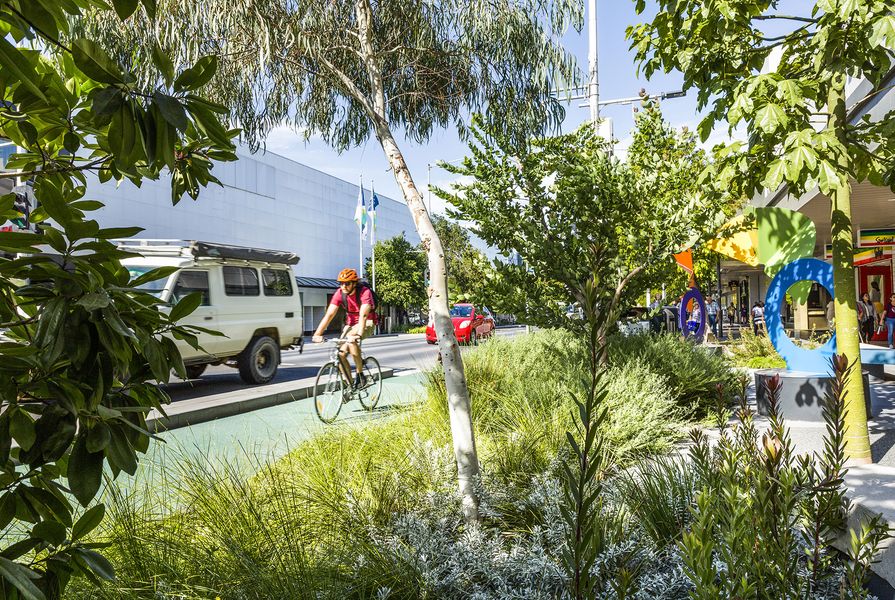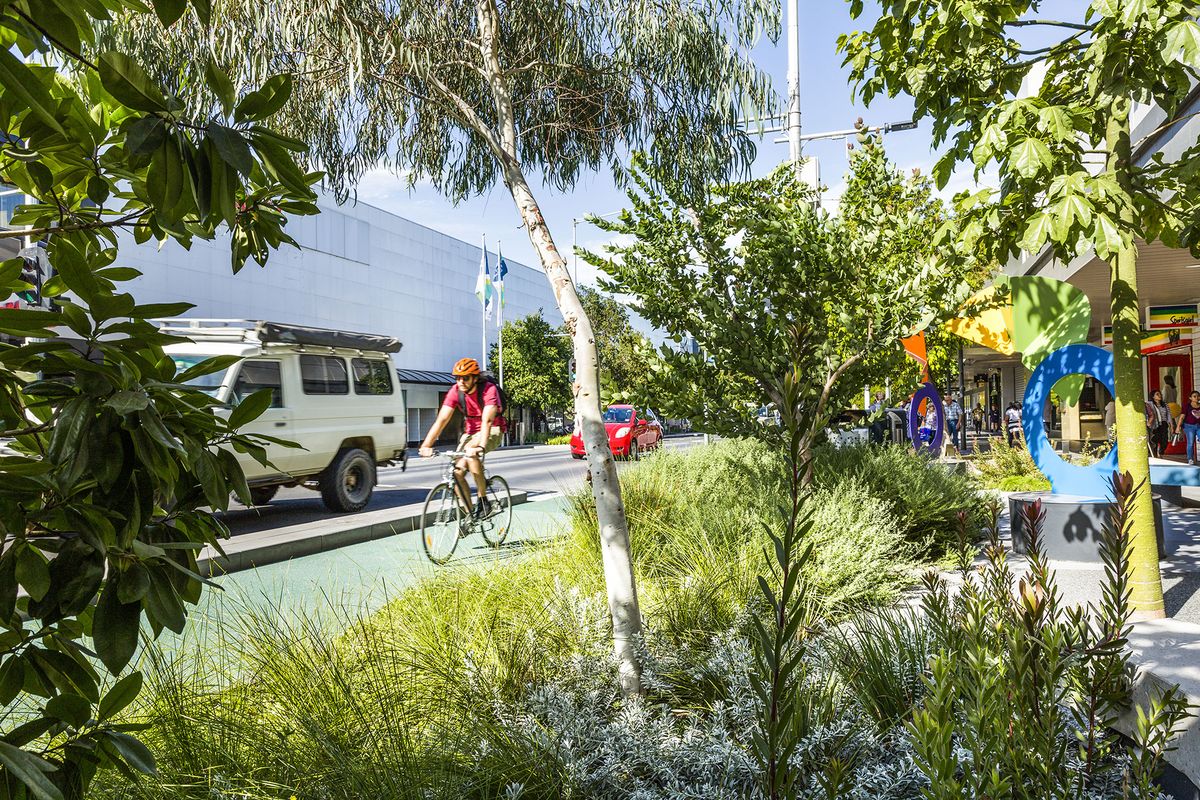The Council of Greater Geelong has approved a plan to partially remove an award-winning green spine project in the Geelong CBD, less than two years after its completion.
The Malop Street Green Spine was designed by Outlines Landscape Architecture, and won the Landscape Architecture Award for Civic Landscape at the National Landscape Architecture Awards in October 2019. It comprised the creation of a new eight-metre-wide botanic walk on the south side of the street and the planting of trees on the north side of the street. New separated bike lanes were also installed on the road in each direction, replacing turning lanes and some on-street parking. The $8 million project was the first stage in a larger green spine project, and received $4.7 million in funding from the state government.
The jury described the project as “a shining example of how traditional retail streets can become inviting public spaces during the day and at night,” and celebrated the “project’s inclusion of intimate spaces not often seen in streetscape design and commended its water-sensitive urban design measures […] Malop Street champions inclusivity, vibrancy, community and the natural environment.”
At a meeting of the council of Tuesday 25 February, councillors voted six to five to remove the northern bicycle lane and reintroduce turning lanes and parking, at a cost of $2 million.
The changes to the project were first proposed by councillor Eddy Kontelj, who objected to increased traffic congestion. In a Notice of Motion, Kontelj said, “The traffic issues and congestion has frustrated and angered a portion of the community and retailers in Malop Street alike whilst also raising safety concerns for pedestrians and the disabled.”
Damon Obst, co-director of Outlines, said the council’s decision was “very disappointing, given all of the work that’s gone into it.”
He also said he found the decision “a little bit bemusing” given the breadth of long-term planning that has been done for Geelong’s CBD and the fact that the Malop Street project was only the first stage of a larger project.
“The Malop Street Green Spine, along with a lot of other projects in Geelong, […] have been underpinned by a whole lot of strategic documents and long-term thinking. These plans all really look to the city as being redefined as a smart, 21st century city and they recognize pressures on liveability as a result of congestion and increased population, climate change, shifting patterns of regional employment.
“A lot of that policy framework were specific things like creating a modal shift to more sustainable transport networks, on road cycling as a safe commuter option, diverting vehicle traffic around city centres, so to dismantle the infrastructure that’s been put in place to deliver on those and realize those long term objectives, just seems really short-sighted and a backwards step to us.”
Obst added that he was particularly concerned about the removal of the cycle lane, which would otherwise have played a central role in the development of the broader cycle network.
“If the aim is to reduce traffic congestion, then we really see that as being, ultimately, [something that] could be achieved by a modal shift in more sustainable transport, on road commuter cycling. To remove that really has no real logic and we hope that some good opposition can be put in place to try and fight the decision.”
In a statement provided to Landscape Australia and ArchitectureAU, the Australian Institute of Landscape Architects (AILA) president Shaun Walsh said, “AILA is concerned for any project that diminishes green infrastructure and replaces them with private cars. The way of the future to deal with climate change and impacts of excessive temperatures and bushfires is more green infrastructure, not less.
“This decision is a retrograde step and is an appalling waste of public funds. Investment should be instead directed to more public promotion and usage of the bikeway as a viable alternative to private cars as part of Geelong’s commitment to addressing climate change and impacts such as bushfires.”
The state government has expressed its displeasure at the council’s decision. In December the government warned the council that it would review its funding arrangements with the council if it went ahead with the modifications. The Geelong Advertiser reported on Wednesday that Bellarine MP Lisa Neville had announced a temporary freeze on state funding for infrastructure projects in the Geelong CBD.
In a statement, Geelong mayor Stephanie Asher defended the move. “The overall vision for the Green Spine will be more obvious to our community once it’s built all the way from Johnstone Park to Eastern Gardens. And at the same time, it’s unfair to expect our community to leave their cars at home when they don’t have access to high standard bus services or other public transport means. In both cases the need for progress is urgent but the funding and timelines are in the state government’s control, so the council’s hands are tied.”
The motion approved by the council stipulates that work on the modifications should begin “no later than the 2020/2021 financial year.”












